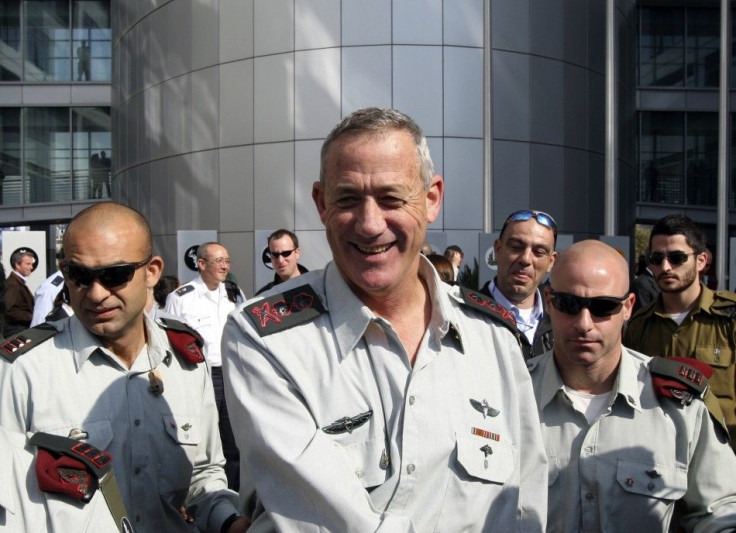Israeli Military Chief Skeptical Iran Will Develop Nuclear Weapons

Iran may not pursue the development of nuclear weapons, said the leader of Israel’s military.
In an interview with Israel’s Haaretz newspaper, Lieutenant-General Benny Gantz, the chief of general staff of the Israel Defense Forces (IDF), said that while a nuclear-armed Iran would pose a grave danger to the region, international diplomatic and economic sanctions will likely force Iran to relinquish its atomic military ambitions.
If Iran goes nuclear it will have negative dimensions for the world, for the region, for the freedom of action Iran will permit itself, Gantz said.
That freedom of action might be expressed, Gantz said, against [Israel], through the force Iran will project toward its clients: Hezbollah in Lebanon, Islamic Jihad in Gaza. And there's also the potential for an existential threat. If they have a bomb, we are the only country in the world that someone calls for its destruction and also builds devices with which to bomb us.”
However, Gantz then reassured: “But despair not. We are a temperate state. The State of Israel is the strongest in the region and will remain so. Decisions can and must be made carefully, out of historic responsibility but without hysteria.”
Iran has insisted that it is developing nuclear power solely for peaceful purposes – an assertion that Israel, the U.S. and European Union find ludicrous given a report late last year by the United Nations’ watchdog, the International Atomic Energy Agency (IAEA) that Iran is indeed seeking to build atomic weapons.
In response, the U.S. and some other western states have applied severe economic sanctions on Iran and its key oil industry, as the war of words between east and west have intensified.
Haaretz noted that Gantz’s moderate and cautious rhetoric is a far cry from the dramatic statements and belligerent stances of Prime Minister Benjamin Netanyahu and defense minister Ehud Barak, both of whom have repeatedly warned that Israel will take military action against Iran.
Of course, in the event that Israel decides to strike Iran, Gantz would be at the very center of that adventure.
Clearly, the more the Iranians progress, the worse the situation is,” Gantz told the paper. “This is a critical year… the problem doesn't necessarily stop on December 31, 2012. We're in a period when something must happen: either Iran takes its nuclear program to a civilian footing only or the world, perhaps we too, will have to do something. We're closer to the end of the discussions than the middle.
Gantz also said he thinks the military option against Iran is the last chronologically, but the first in terms of its credibility.
“If it's not credible it has no meaning. We are preparing for it in a credible manner. That's my job, as a military man, he declared.
Gantz also expressed some skepticism over Iran’s designs of making nuclear bombs.
[Iran] is going step by step to the place where it will be able to decide whether to manufacture a nuclear bomb. It hasn't yet decided whether to go the extra mile, he said. “[Their nuclear] program is too vulnerable, in Iran's view. If the supreme religious leader Ayatollah Ali Khamenei wants, he will advance it to the acquisition of a nuclear bomb, but the decision must first be taken. It will happen if Khamenei judges that he is invulnerable to a response. I believe he would be making an enormous mistake, and I don't think he will want to go the extra mile.”
Gantz also made the comment that he thinks Iranian leaders are “very rational people” in contrast to the views of some Israeli officials, like Vice Premier Silvan Shalom who called Tehran’s bosses “lunatics.”
The United States president Barack Obama, who has conferred a few times with Netanyahu over the question of Iran has emphasized the need to pressure Iran diplomatically and with sanctions – however, he, too, has not ruled out the likelihood of Israel striking Iran militarily.
It’s unclear if such a bold step would actively involve the American military or not.
Gantz commented that he is in frequent touch with his Washington counterpart, Chairman of the Joint Chiefs of Staff Gen., Martin E. Dempsey.
We speak a great deal with the Americans,” Gantz said.
“We are partners. We and the United States have a large common alignment of interests and relations, but America looks at America and Israel [looks at] Israel. We aren't two oceans away from the problem.”
The IDF chief also addressed the logistic nightmare that an attack on Iran would entail.
I don't pretend to determine that now,” he lamented.
“I am preparing for full deployment of our capabilities. The political leadership will have to take courageous, painful decisions. There are a certain number of critical decisions in a war. The chief of staff makes about 10 of these in his sphere of responsibility in wartime, and the political leadership makes about half this number.
James Reynolds, a BBC correspondent, said of Gantz’s remarks: ” Israel's serving military commanders don't speak in public as often as their political leaders. But the generals' occasional public comments consistently paint a more complex picture of Israel's views on Iran.”
© Copyright IBTimes 2025. All rights reserved.





















